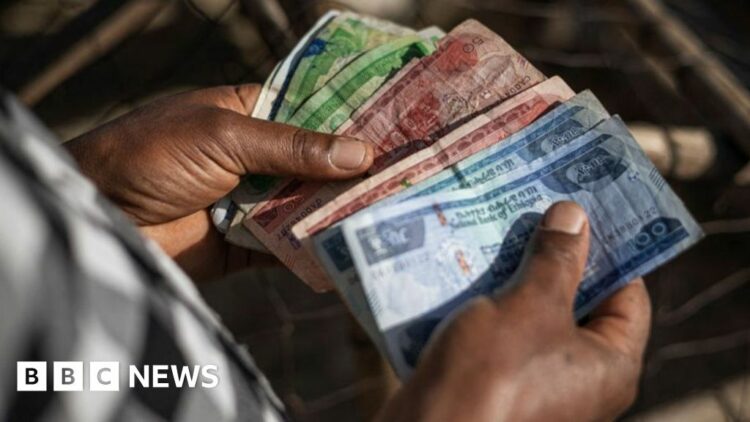Image source, Getty Images
Image caption, Ordinary Ethiopians have received the news with apprehensionArticle informationAuthor, Kalkidan YibeltalRole, BBC News, Addis Ababa
29 July 2024
The value of Ethiopia’s currency has fallen by 30% against the US dollar after the government relaxed currency restrictions, one the country’s biggest banks, the Commercial Bank of Ethiopia, has said.
The government reversed its long-standing policy of fixing the exchange rate in a bid to secure a loan of $10.7bn (£8.3bn) from the International Monetary (IMF) and World Bank.
Some Ethiopians have received the news with apprehension fearing that it will lead to a sharp rise in the cost of living at a time when inflation is already high.
The country has been struggling with chronic foreign currency shortages particularly in recent years.
The economy has suffered due to a brutal two-year civil war in the northern Tigray region, which ended in 2022, and ongoing conflicts in other regions, making it difficult for the country to attract much needed foreign investment.
Under the new policy announced by the central bank, the value of the Ethiopian currency – the birr – will be set by the market.
It comes as negotiations between the government and the IMF reach their final stage.
Analysts say the IMF has been calling for a series of reforms, including floating the currency, before it agrees to a bailout, Reuters news agency reports.
The negotiations also involve restructuring Ethiopia’s external debt of around $28bn.
In a statement on Monday morning, the head of the central bank, Mamo Mehretu, said the country was immediately introducing a competitive, market-based foreign exchange regime, in a major policy shift in half a century.
The change allows commercial banks to buy and sell foreign currencies at negotiated prices.
Previous similar devaluations of the birr were followed by sharp spikes in the cost of food and other items – especially items imported from abroad.
To cushion the transition and stave off inflation and market instability, Ethiopia’s government has pledged to provide subsidies on essential goods such as petrol as well as extra help for low-income workers.
One of the reasons cited by the central bank for the new policy was the flourishing of an “unanchored” parallel market, where, up until the policy change, the dollar was costing double the official rate.
Importers were often forced to turn to the parallel market to purchase dollars because of a chronic shortage of foreign currency, meaning that some of the higher costs have already been priced in.
But there are fears that the value of the birr might now continue to fall below the rate it was fetching on the parallel market.
Additional reporting by Natasha Booty
More BBC stories on Ethiopia:
Image source, Getty Images/BBC
Source link : https://www.bbc.com/news/articles/cxr2k24z29xo.amp
Author :
Publish date : 2024-07-29 22:52:50
Copyright for syndicated content belongs to the linked Source.
